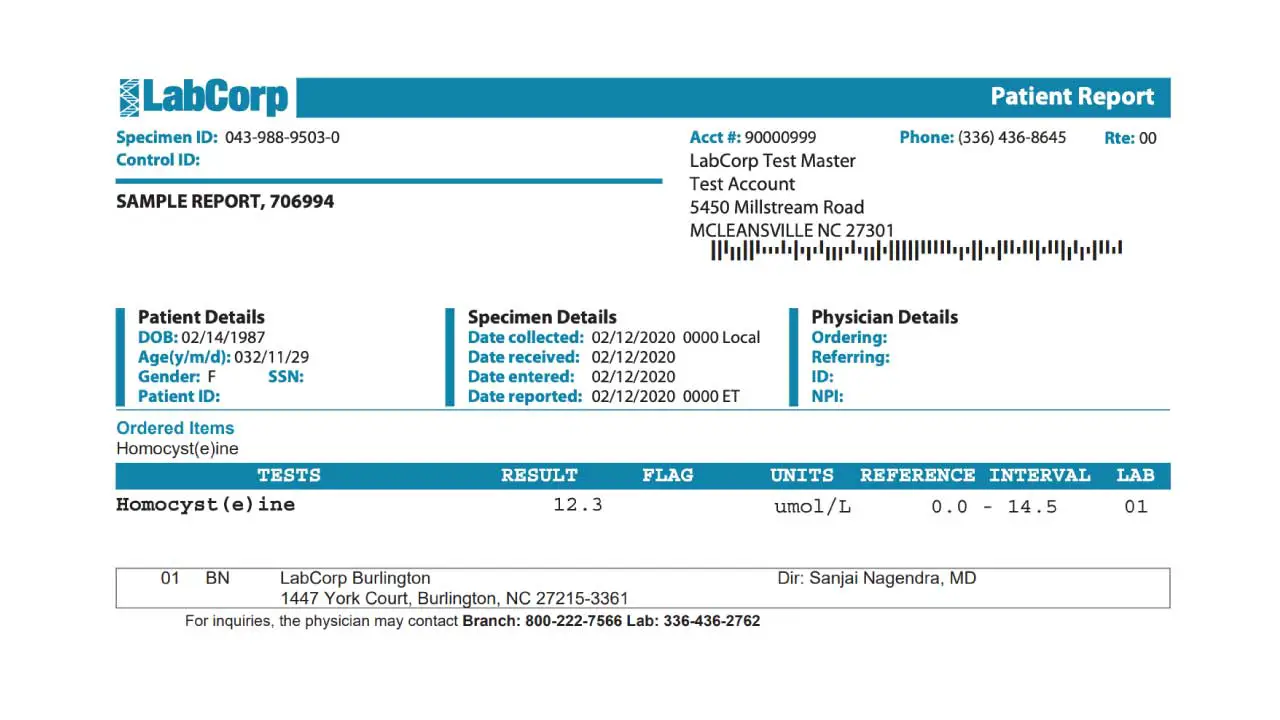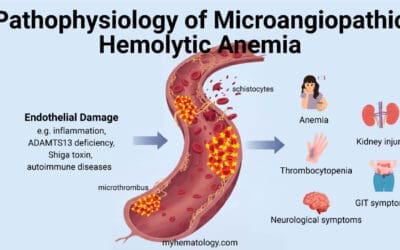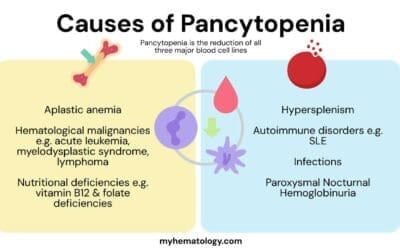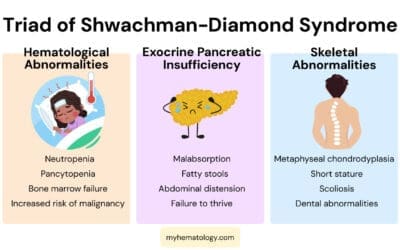Homocysteine is an amino acid naturally produced in the body. It’s broken down with the help of B vitamins. If your body doesn’t have enough of these vitamins, homocysteine levels can rise. Elevated homocysteine levels (hyperhomocysteinemia) are associated with an increased risk of heart disease and stroke. The homocysteine blood test can also help identify potential vitamin deficiencies, such as vitamin B6, B9 (folate), or B12, which play a role in homocysteine metabolism. Addressing these deficiencies may help lower homocysteine levels and reduce your risk of heart disease.
Quick guide
Homocysteine Blood Test
- Tests for: Homocysteine level in your blood
- How it works: Buy a lab test from Personalabs.com and schedule an appointment at your nearest local lab
- Specimen required: Blood from the veins
- Results in: 2 – 10 business days
Verisana Homocysteine Test (At-home test kit)
- Tests for: Homocysteine levels in your body
- How it works: Buy a kit from Amazon.com, collect your blood on a small card and mail it to a Verisana lab with a prepaid envelope
- Specimen required: Finger prick blood sample
- Results in: 7 – 10 business days
empowerDx My MTHFR Gene Test (At-home test kit)
- Tests for: 677 variant and 1298 variant of the MTHFR gene
- How it works: Buy a lab test from empowerdxlab.com, collect saliva from a mouth swab and mail it to empowerDx lab with a prepaid envelope
- Specimen required: Mouth swab
- Results in: 3 – 6 business days
Disclaimer: This information is based on research and is accurate to the best of our knowledge at the time of publication. Please note that the writer has not personally used or tested these products.
What are the Health Risks of Hyperhomocysteinemia?
Hyperhomocysteinemia, the condition of having elevated levels of homocysteine in the blood, is associated with an increased risk of several health problems, primarily cardiovascular diseases.
- Heart Disease: High homocysteine levels can damage blood vessel walls, promoting the formation of plaque (fatty deposits) that can narrow arteries. This can lead to heart attacks and strokes.
- Stroke: High homocysteine levels can increase the risk of blood clots forming, which can block blood flow to the brain, causing a stroke.
- Peripheral Artery Disease (PAD): This condition affects blood flow to the legs and arms, causing pain, numbness, and even tissue damage.
What are the Causes of Hyperhomocysteinemia?
Genetic Factors
- Cystathionine β-synthase (CBS) gene mutations: Mutations in the CBS gene can significantly reduce or eliminate CBS enzyme activity, leading to a severe buildup of homocysteine. This condition is known as homocystinuria.
- MTHFR Gene Mutation: This common genetic variation can affect the body’s ability to use folate, a crucial vitamin for homocysteine breakdown.
- Methionine synthase (MTR) gene mutations: The MTR enzyme is also involved in folate-dependent homocysteine metabolism. Mutations in the MTR gene can impair its function, leading to elevated homocysteine levels.
- Methionine synthase reductase (MTRR) gene mutations: The MTRR enzyme is responsible for activating the MTR enzyme. Mutations in the MTRR gene can reduce MTRR activity, indirectly affecting homocysteine metabolism.
Nutritional Deficiencies
- Folate Deficiency: Folate is essential for converting homocysteine into other compounds.
- Vitamin B6 Deficiency: This vitamin also plays a crucial role in homocysteine metabolism.
- Vitamin B12 Deficiency: This vitamin is necessary for the proper functioning of folate.
Other Factors
- Kidney Disease: Kidney disease can impair the body’s ability to remove homocysteine from the blood.
- Medications: Some medications, such as methotrexate and certain anticonvulsants, can interfere with folate metabolism.
- Alcohol Consumption: Excessive alcohol intake can also contribute to elevated homocysteine levels.
- Diet: A diet high in methionine (an amino acid found in protein-rich foods) can increase homocysteine production.
It’s important to note that often, multiple factors may contribute to the development of hyperhomocysteinemia.
What are the Signs and Symptoms of Hyperhomocysteinemia?
Important Note: Hyperhomocysteinemia itself often does not cause any noticeable symptoms.
The symptoms that may arise are usually related to the underlying conditions associated with elevated homocysteine levels.
Cardiovascular Disease
- Chest pain (angina)
- Shortness of breath
- Heart palpitations
- Weakness
- Fatigue
Stroke
- Sudden numbness or weakness in the face, arm, or leg, especially on one side of the body
- Sudden confusion, difficulty speaking or understanding
- Sudden trouble seeing in one or both eyes
- Sudden dizziness, loss of balance, or coordination
- Sudden severe headache
Peripheral Artery Disease (PAD)
- Leg pain (claudication) that occurs during exercise and subsides with rest
- Coldness or numbness in the extremities
- Poor wound healing
- Sores on the legs or feet that don’t heal
How Do We Test for Hyperhomocysteinemia?
The primary way to test for hyperhomocysteinemia is through a homocysteine blood test.
The reference range for homocysteine levels can vary slightly depending on the laboratory and the specific assay used. However, generally accepted ranges are:
- Normal: Less than 15 micromoles per liter (µmol/L)
- Moderate: 15 to 30 µmol/L
- Intermediate: 30 to 100 µmol/L
- Severe: Greater than 100 µmol/L
Recommended Tests
Homocysteine Blood Test

- Tests for: Homocysteine level in your blood
- How it works: Buy a lab test from Personalabs.com and schedule an appointment at your nearest local lab
- Specimen required: Blood from the veins
- Results in: 2 – 10 business days
- Special preparation: You must fast for 12 hours prior to having your blood drawn for homocysteine testing.
About the test
This test measures the homocysteine levels in your plasma/serum.
Pros
✔ No doctor visit required
✔ Excellent service
Cons
❌ Quest: Tests cannot be conducted at lab locations in Arizona, New Jersey, New York, or Rhode Island.
Verisana Homocysteine Test (At-home test kit)

- Tests for: Homocysteine levels in your body
- How it works: Buy a kit from Amazon.com, collect your blood on a small card and mail it to a Verisana lab with a prepaid envelope
- Specimen required: Finger prick blood sample
- Results in: 7 – 10 business days
About the test
The Verisana Homocysteine Test kit is a home test that measures the levels of homocysteine in your blood. Order your kit, collect a sample at your convenience, and return it to the lab. The laboratory will analyze the blood sample and determine the levels of homocysteine. Your results will be available online and emailed to you. The test kit encompasses all necessary components, including sampling instructions, supplies, and a return shipping envelope. No additional fees are incurred – scientific analysis and a comprehensive laboratory report are included.
Pros
✔ Easy-to-use
✔ Can be done at your convenience in the privacy of your own home
✔ CLIA-certified lab
Cons
❌ Needs blood sample to dry for one hour and then needs to ship within 24 hours
❌ Due to regulatory reasons, this test is currently not available in NY/NJ/RI/MD
❌ Must be at least 18 & over to take the test
empowerDx My MTHFR Gene Test (At-home test kit)

- Tests for: 677 variant and 1298 variant of the MTHFR gene
- How it works: Buy a lab test from empowerdxlab.com, collect saliva from a mouth swab and mail it to empowerDx lab with a prepaid envelope
- Specimen required: Mouth swab
- Results in: 3 – 6 business days
About the test
The empowerDx My MTHFR Gene Test is an at-home test kit that analyzes your DNA to identify variations in the MTHFR gene. The MTHFR gene provides instructions for producing an enzyme crucial for converting folate (vitamin B9) into its active form, which is essential for various bodily functions, including DNA methylation and neurotransmitter production. The test involves collecting a saliva sample using an oral swab, which is then sent to a laboratory for analysis. Results are typically available within a few days and can be accessed online through a secure portal. This information can help individuals understand how their MTHFR gene variations may affect their health and make informed decisions about their lifestyle and potential supplementation needs.
Pros
✔ Easy-to-use
✔ No blood required, cheek swab only
✔ Can be done at your convenience in the privacy of your own home
✔ CLIA-certified lab
Cons
❌ Need to collect enough cheek swab sample and then ship within 24 hours of registering the kit
❌ Prepaid envelope is only for the US. International postage is at your own cost
❌ Typically focuses on a limited number of gene variations, potentially missing other important genetic factors
❌ Understanding and interpreting genetic test results can be complex and may require guidance from a healthcare professional
Who Can/Should Get Tested?
While a homocysteine blood test isn’t part of routine screening for everyone, certain individuals may benefit from getting tested. Here are some groups who may be considered for homocysteine testing.
Individuals with a personal or family history of
- Early-onset cardiovascular disease (heart attack, stroke)
- Venous thrombosis (blood clots in veins)
- Neural tube defects (in women planning pregnancy)
Individuals with suspected vitamin deficiencies
- Symptoms of B12 or folate deficiency (fatigue, weakness, neurological issues)
- Conditions that increase the risk of malabsorption (e.g., celiac disease)
- Vegetarians or vegans who may have limited B12 intake
Individuals with certain medical conditions
- Chronic kidney disease
- Hypothyroidism
- Certain genetic disorders (e.g., homocystinuria)
Women planning pregnancy
Elevated homocysteine levels can increase the risk of neural tube defects in babies.
It’s important to consult with a healthcare provider to determine if homocysteine testing is appropriate for your individual circumstances. They will consider your medical history, risk factors, and any symptoms you may be experiencing to make a recommendation.
How is Hyperhomocysteinemia Treated?
The treatment for hyperhomocysteinemia typically focuses on addressing the underlying causes and lowering homocysteine levels.
Vitamin Supplementation
- Folate (Vitamin B9): This is crucial for converting homocysteine back to methionine. Supplementation is often recommended, especially for those with MTHFR gene mutations or folate deficiency.
- Vitamin B12: Works in conjunction with folate in homocysteine metabolism. Supplementation may be needed, particularly for vegetarians, vegans, or those with absorption issues.
- Vitamin B6: Plays a role in breaking down homocysteine. Supplementation may be recommended, especially if there’s a deficiency.
Lifestyle Modifications
- Diet:
- Emphasize folate-rich foods: leafy greens, legumes, fortified grains.
- Ensure adequate B12 intake: meat, poultry, fish, dairy, fortified foods.
- Limit methionine-rich foods: red meat, dairy, eggs (in some cases).
- Quit Smoking: Smoking can increase homocysteine levels.
- Moderate Alcohol Consumption: Excessive alcohol intake can interfere with homocysteine metabolism.
Addressing Underlying Conditions
- Kidney Disease: Managing kidney disease can help improve homocysteine levels.
- Medications: If medications contribute to hyperhomocysteinemia, alternative options may be considered.
Betaine
In some cases, betaine (trimethylglycine) may be used to help lower homocysteine levels.
Important Notes
- Personalized Approach: Treatment should be tailored to the individual based on the cause of hyperhomocysteinemia, other health conditions, and risk factors.
- Monitoring: Regular monitoring of homocysteine levels is important to ensure treatment effectiveness.
Disclaimer: This information is for general knowledge and informational purposes only and does not constitute medical advice. Always consult with a qualified healthcare professional for any health concerns or before making any decisions related to your health.
References
- Hermann A, Sitdikova G. Homocysteine: Biochemistry, Molecular Biology and Role in Disease. Biomolecules. 2021 May 15;11(5):737. doi: 10.3390/biom11050737. PMID: 34063494; PMCID: PMC8156138.
- Finkelstein JD, Martin JJ. Homocysteine. Int J Biochem Cell Biol. 2000 Apr;32(4):385-9. doi: 10.1016/s1357-2725(99)00138-7. PMID: 10762063.
- Wijekoon EP, Brosnan ME, Brosnan JT. Homocysteine metabolism in diabetes. Biochem Soc Trans. 2007 Nov;35(Pt 5):1175-9. doi: 10.1042/BST0351175. PMID: 17956306.
- Bleich S, Hillemacher T. Homocysteine, alcoholism and its molecular networks. Pharmacopsychiatry. 2009 May;42 Suppl 1:S102-9. doi: 10.1055/s-0029-1214396. Epub 2009 May 11. PMID: 19434547.
- Temple ME, Luzier AB, Kazierad DJ. Homocysteine as a risk factor for atherosclerosis. Ann Pharmacother. 2000 Jan;34(1):57-65. doi: 10.1345/aph.18457. PMID: 10669187.
- Ferechide D, Radulescu D. Hyperhomocysteinemia in renal diseases. J Med Life. 2009 Jan-Mar;2(1):53-9. PMID: 20108491; PMCID: PMC5051482.




